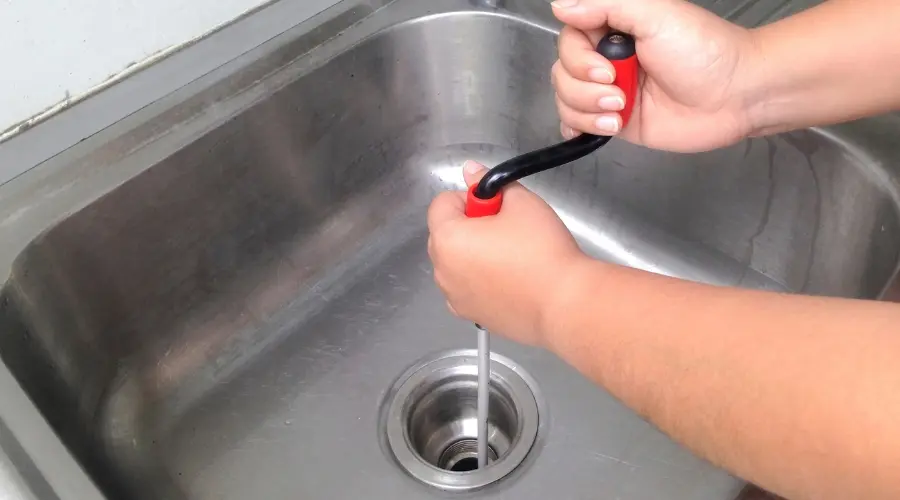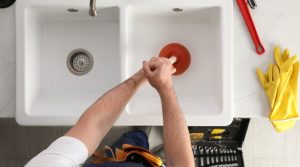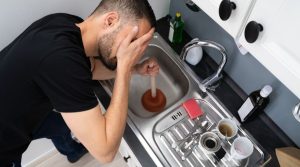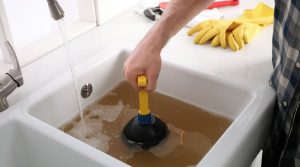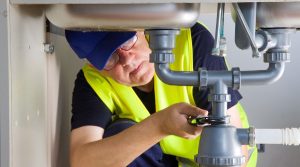The Hidden Dangers Lurking Under Your Sink
Have you ever reached for that bottle of chemical drain cleaner when faced with a stubborn clog, only to wonder if there’s a better solution? You’re not alone. Every day, countless homeowners unknowingly damage their plumbing systems with harsh chemicals that promise quick fixes but deliver long-term problems.
As a homeowner, few things are more frustrating than a slow-draining sink or a completely clogged shower. Water pooling around your feet during a shower or a sink that takes forever to drain can disrupt your daily routine and signal bigger problems ahead. While chemical drain cleaners seem like a convenient solution, professional plumbers have been warning against them for years—and for good reason.
The Destructive Truth About Chemical Drain Cleaners
Chemical drain cleaners work through aggressive chemical reactions that generate heat to dissolve clogs. While they might seem effective in the moment, they’re silently damaging your plumbing system with each use.
How Chemical Cleaners Damage Your Plumbing
- Pipe Corrosion: The harsh chemicals eat away at metal pipes over time, leading to leaks and premature pipe replacement
- PVC Damage: Even “safe for pipes” formulas can warp and weaken plastic pipes when used repeatedly
- Fixture Damage: The chemicals can deteriorate seals and fixtures, causing leaks around sinks and tubs
- Incomplete Clog Removal: Many chemical cleaners only create a small channel through the clog rather than removing it completely
- Environmental Impact: These chemicals eventually enter the water system, harming aquatic life and contaminating water sources
Health Risks You Can’t Ignore
Chemical drain cleaners aren’t just bad for your plumbing—they’re dangerous for your health:
- Toxic Fumes: The gases released can irritate eyes, lungs, and nasal passages
- Chemical Burns: Accidental skin contact can cause severe chemical burns
- Child Safety Hazards: These products pose serious ingestion risks for curious children
- Dangerous Reactions: Mixing different chemical cleaners can create toxic gases that cause serious respiratory issues
Warning Signs Your Drains Need Attention
Catching drainage issues early can help you avoid emergency situations and expensive repairs. Watch for these warning signs:
- Water drains slowly from sinks, tubs, or showers
- Gurgling sounds coming from drains
- Unpleasant odors emanating from drains
- Water backing up into other fixtures when using the toilet or washing machine
- Multiple drains clogging simultaneously (indicating a main line issue)
- Recurring clogs in the same drain despite clearing attempts
Plumber-Approved Solutions for Clogged Drains
Instead of reaching for chemical cleaners, try these effective, pipe-friendly alternatives that professional plumbers recommend:
Physical Removal Methods (Most Effective)
- Plunger: A good quality plunger creates suction to dislodge clogs
- Cup plungers work best for sinks and tubs
- Flange plungers are designed specifically for toilets
- Ensure enough water covers the plunger cup for proper suction
- Drain Snake/Auger: For stubborn clogs deeper in the pipes
- Manual drain snakes are affordable and effective for most household clogs
- Electric augers provide more power for difficult blockages
- Different head attachments work for different types of clogs
- Zip-It Tool: Inexpensive plastic tools with barbs that grab hair clogs
- Perfect for bathroom sink and shower drains
- No disassembly required—simply insert and pull
- Disposable options available for one-time use
Natural Enzymatic Cleaners
Enzymatic cleaners use bacteria and enzymes to naturally break down organic matter:
- How They Work: Natural enzymes digest organic material like hair, food, soap scum, and grease
- Benefits: Non-corrosive to pipes, environmentally friendly, and safe for septic systems
- Best Uses: Regular maintenance to prevent clogs rather than removing existing blockages
- Application: Pour into drain and let sit overnight for best results
DIY Home Remedies
Try these kitchen staples before calling a plumber:
Baking Soda & Vinegar Method:
- Pour 1/2 cup baking soda down the drain
- Follow with 1/2 cup white vinegar
- Cover drain immediately with a plug or cloth
- Let fizz for 30 minutes
- Flush with boiling water
Hot Water, Salt, and Baking Soda:
- Mix 1/2 cup salt with 1/2 cup baking soda
- Pour down drain
- Follow immediately with boiling water
- Let sit for several hours or overnight
- Flush with hot tap water
Boiling Water (For Grease Clogs):
- Boil a full kettle of water
- Pour slowly down the drain in three stages
- Allow water to work through the clog between each pour
- Works best on kitchen sinks with grease buildup
Preventative Maintenance: The Key to Clog-Free Drains
The best way to deal with clogs is to prevent them in the first place. Implement these preventative measures to keep your drains flowing smoothly:
Weekly Maintenance Checklist
- Pour boiling water down kitchen sink drains to dissolve grease buildup
- Use drain covers/strainers in all sinks, showers, and tubs
- Clear visible hair from shower drains after each use
- Run hot water for 15 seconds after each sink use
- Pour 1/2 cup baking soda followed by 1/2 cup vinegar down drains monthly
Kitchen Drain Protection
- Grease Management: Never pour cooking oil or grease down drains—collect in containers for disposal
- Food Scraps: Use sink strainers to catch food particles; scrape plates into trash before washing
- Coffee Grounds: Dispose in compost or trash, never down the sink
- Starchy Foods: Rice, pasta, and potato peels can expand and cause blockages
Bathroom Drain Protection
- Hair Control: Install mesh drain covers in showers and tubs
- Soap Scum Prevention: Consider switching to liquid soap which creates less residue
- Toothpaste & Makeup: Wipe excess from sink rather than rinsing down drain
- Monthly Flushing: Use hot water and dish soap to clear potential buildup
When to Call a Professional Plumber
While DIY methods can handle many common clogs, some situations require professional intervention:
Signs It’s Time to Call a Plumber
- Multiple Drains Clogged: Indicates a potential main line blockage
- Recurring Clogs: Suggests a deeper problem within your plumbing system
- Sewage Smells: Could indicate a sewer line issue requiring immediate attention
- Water Backing Up: In multiple fixtures or unusual places
- Strange Noises: Consistent gurgling sounds when water drains
- Failed DIY Attempts: If you’ve tried multiple solutions without success
Professional plumbers have specialized tools that can address more serious clogs without damaging your plumbing system:
- Video Inspection: Cameras identify the exact location and nature of clogs
- Hydro Jetting: High-pressure water cleaning that scours pipe walls
- Professional-Grade Snakes: Can reach deeper into plumbing systems
- Advanced Enzymatic Treatments: Commercial-strength formulas for tough organic buildups
The Cost Comparison: Prevention vs. Repair
Investing in preventative maintenance is always more cost-effective than emergency repairs:
| Preventative Measure | Average Cost | Emergency Repair | Average Cost |
| Drain covers | $5-15 each | Emergency plumber visit | $150-300 |
| Enzymatic cleaner | $10-20 | Pipe replacement | $1,000-3,000+ |
| Basic drain snake | $15-30 | Sewer line repair | $3,000-7,000+ |
| Annual maintenance | $100-200 | Water damage restoration | $5,000+ |
Take Action Now: Your Drain Protection Plan
Protecting your plumbing system starts today. Here’s your action plan:
- Remove All Chemical Cleaners: Safely dispose of any chemical drain cleaners at your local hazardous waste facility
- Invest in Prevention: Purchase quality drain strainers for all sinks, tubs, and showers
- Create a Maintenance Schedule: Set calendar reminders for monthly drain maintenance
- Assemble Your Toolkit: Acquire a plunger, basic drain snake, and natural cleaning ingredients
- Save a Pro’s Number: Research and save contact information for a reputable local plumber
Ready for Clog-Free Living?
Your plumbing system represents a significant investment in your home, and protecting it doesn’t have to involve harmful chemicals. By implementing these plumber-approved methods and preventative strategies, you’ll avoid the costly damage caused by chemical drain cleaners while keeping your drains flowing freely.
Don’t wait for a plumbing emergency to change your habits. Start your pipe-friendly drain care routine today and enjoy the peace of mind that comes with properly maintained plumbing.
Need help with a stubborn drain issue? Contact our team of licensed plumbers for a free consultation. We specialize in non-invasive drain cleaning methods that protect your plumbing system while effectively eliminating clogs. Call us at 973-601-5593 or visit CBJ Plumbers – Plumbing Services in NJ to schedule your appointment today!

